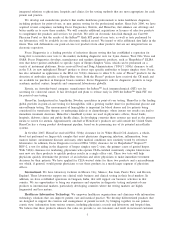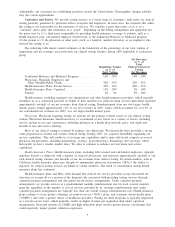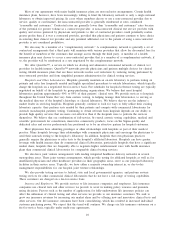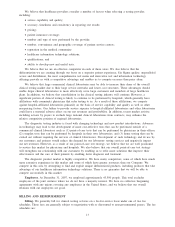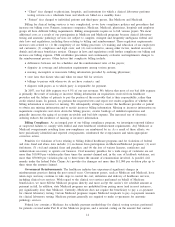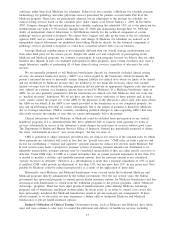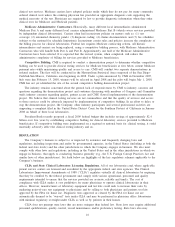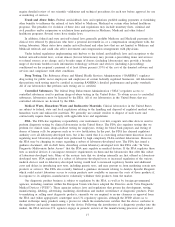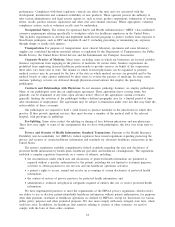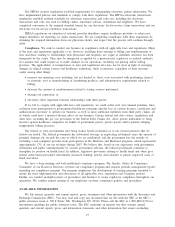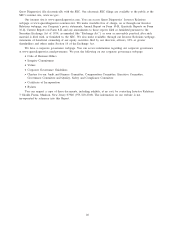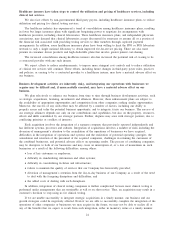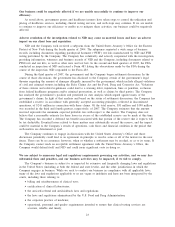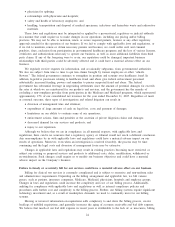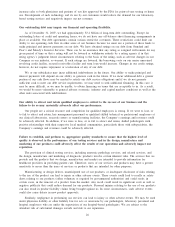Quest Diagnostics 2007 Annual Report Download - page 26
Download and view the complete annual report
Please find page 26 of the 2007 Quest Diagnostics annual report below. You can navigate through the pages in the report by either clicking on the pages listed below, or by using the keyword search tool below to find specific information within the annual report.require detailed review of our scientific validations and technical procedures for each test before approval for use
or marketing of services.
Fraud and Abuse Rules. Federal anti-kickback laws and regulations prohibit making payments or furnishing
other benefits to influence the referral of tests billed to Medicare, Medicaid or certain other federal healthcare
programs. The penalties for violation of these laws and regulations may include monetary fines, criminal and
civil penalties and/or suspension or exclusion from participation in Medicare, Medicaid and other federal
healthcare programs. Several states have similar laws.
In addition, federal and state anti-self-referral laws generally prohibit Medicare and Medicaid payments for
clinical tests referred by physicians who have a personal investment in, or a compensation arrangement with, the
testing laboratory. Many states have similar anti-self-referral and other laws that are not limited to Medicare and
Medicaid referrals and could also affect investment and compensation arrangements with physicians.
Under federal regulations implementing safe harbors to the federal anti-kickback laws and exceptions to the
federal anti-self-referral laws, certain donors (but not laboratories) may provide e-prescribing items and services
to referral sources at no charge, and a broader range of donors (including laboratories) may provide a broader
range of electronic health records information technology software and services (including e-prescribing)
conditioned on the recipient’s payment of at least fifteen percent (15%) of the cost of the donated software and
services and compliance with other conditions.
Drug Testing. The Substance Abuse and Mental Health Services Administration (“SAMHSA”) regulates
drug testing for public sector employees and employees of certain federally regulated businesses. All laboratories
that perform such testing must be certified as meeting SAMHSA’s detailed performance and quality standards.
All of our laboratories that perform such testing are so certified.
Controlled Substances. The federal Drug Enforcement Administration (“DEA”) regulates access to
controlled substances used to perform drugs-of-abuse testing in the United States. To obtain access to controlled
substances, laboratories must be licensed by the DEA. All of our laboratories in the United States that use
controlled substances are licensed by the DEA.
Medical Waste, Hazardous Waste and Radioactive Materials. Clinical laboratories in the United States
are subject to federal, state and local regulations relating to the handling and disposal of regulated medical waste,
hazardous waste and radioactive materials. We generally use outside vendors to dispose of such waste and
contractually require them to comply with applicable laws and regulations.
FDA. The FDA has regulatory responsibility over instruments, test kits, reagents and other devices used to
perform diagnostic testing by clinical laboratories in the United States. The FDA also regulates testing that we
perform for clinical trials, drugs-of-abuse testing for employers, testing for blood bank purposes and testing of
donors of human cells for purposes such as in vitro fertilization. In the past, the FDA has claimed regulatory
authority over all laboratory-developed tests, but it has stated that it is exercising enforcement discretion in not
regulating most laboratory-developed tests performed by high complexity CLIA-certified laboratories. However,
the FDA may be changing its stance regarding a subset of laboratory-developed tests. The FDA has issued a
guidance document, still in draft form, describing certain laboratory-developed tests that FDA calls “In Vitro
Diagnostic Multivariate Index Assays” that the FDA may regulate as medical devices. If the FDA regulates these
tests as medical devices it can impose extensive requirements on them and the laboratories that offer this subset
of laboratory-developed tests. Many of the esoteric tests that we develop internally are first offered as laboratory-
developed tests. FDA regulation of a subset of laboratory-developed tests or increased regulation of the various
medical devices used in laboratory-developed testing would lead to increased regulatory burden and additional
costs and delays in introducing new tests, including genetic tests, and may prevent us from marketing certain new
products or services. The FDA also recently finalized a guidance document relating to Analyte Specific Reagents
which could restrict laboratory access to certain products now available or increase the costs of those products if,
in response to its adoption, manufacturers voluntarily withdraw their products from the market.
Our diagnostic product business is subject to regulation by the FDA, as well as by foreign governmental
agencies, including countries within the European Union who have adopted the Directive on In Vitro Diagnostic
Medical Devices (“IVDD”). These agencies enforce laws and regulations that govern the development, testing,
manufacturing, labeling, advertising, marketing, distribution and market surveillance of diagnostic products. Prior
to marketing or selling most diagnostic products, currently we are required to secure clearance or approval from
the FDA and (when appropriate) counterpart non-U.S. regulatory agencies, although the IVDD allows us to
market in Europe many products using a process in which the manufacturer certifies that the device conforms to
the regulatory and quality requirements for the device. Following the introduction of a diagnostic product into the
market, the FDA and non-U.S. agencies engage in periodic reviews of the manufacturing processes and product
17


